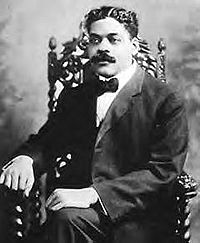Throughout the month of February, Black History Month [1] is celebrated in the United States and Canada, as special events and other commemorative activities often fill the calendar during this time. Several bloggers have started an online project to honor another group of people of Black African ancestry and complement the festivities with additional information.
Anthony Otero, a Puerto Rican and Ecuadorian blogger, who works at Syracuse University, wrote on his blog [2] Inside My Head:
In taking time to really look at this month, we normally focus on African Americans as they should. However, I would like to see that we expand the realm of this exploration to encompass Afro Latinos.
The term Afro-Latinos or Afro-Latin Americans [3] refer to Latin Americans with Black African ancestry, which is estimated to be between 100-150 million across the region. See here [4] for Afro-Latino populations in the Americas. Another term that many self-identifying Afro-Latinos have been using is Latinegro/a. The word “negro” means black in Spanish.
Together with bloggers Bianca Laureano [5] and Prof. Susurro [6], Otero started the Latinegr@ [7]Tumblr blog. Its mission:
Expanding the inclusively of Black History Month is a goal for several of us, self-identified LatiNeg@s, Afro-Latinos and Afro-Caribeños. As people who recognize and claim the African heritage and history, we have often been excluded from US History, whether it be Black history or Latino history (Septermber 15-October 15). Join us in honoring and recognizing LatiNegr@s this year during Black and Latino History Month. We are Black, Latino and from the Caribbean. We REPRESENT!
Laureano also describes how the project came to life on the blog [8] Vivir Latino:
It all started when I posted a list of LatiNegr@s To Look Out For In 2010. I began to talk with writer and poet Anthony about how so many of us don’t know our history, how we are omitted, and the need for recognition and representation. We decided to create a virtual project on our own online homes as well as create a communal space for discussion, engagement, and knowledge production.
She has already helped made a list of Afro-Latinos to watch for in 2010 [10], and others like blogger Efrain Ortiz, Jr. have been sharing information on important Afro-Latinos from their home countries. For example, Ortiz writes about Arturo Alfonso Schomburg [11], a Puerto Rican historian, writer, and activist, who helped the research regarding important contributions made by other Afro-Latinos in the late 19th and early 20th century.
